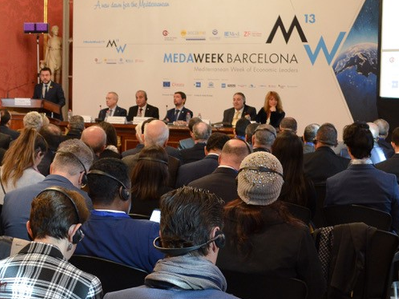- At the opening ceremony of the 13th Mediterranean Week of Economic Leaders (MedaWeek), the vice-president stressed the government’s commitment to building the present and future of the Mediterranean
- He said the 2020 budget aims to increase spending on public services to the levels reached before the financial crisis, reduce social and territorial inequality, promote innovation, and advance towards achieving zero emissions and zero waste

Speaking at the opening ceremony of the 13th Mediterranean Week of Economic Leaders (MedaWeek), held this morning at the Llotja de Mar building in Barcelona, the Vice-President of the Government of Catalonia and Minister of Economy and Finance, Pere Aragonès, stressed the government’s commitment to building the present and future of the Mediterranean.
“The 2020 budget has been prepared based on the commitments made in the 2030 Agenda for Sustainable Development,” he said. Aragonese explained that the accounts for next year were prepared taking into account the commitments undertaken by the international community and reflected in the 17 Sustainable Development Goals (SDGs) adopted by the United Nations, which serve as “a guide for transforming Catalonia and helping to make the world a better place”.
According to the vice-president, the Government of Catalonia’s preliminary draft budget for 2020 links allocation of resources to priority programmes set out in the Government Plan adopted to implement the 2030 Agenda in Catalonia, and prioritises the SDGs that fit into four strategic pillars: “First, we need to take a step forward and get up to speed after years engaged in titanic effort to overcome the fallout of the financial crisis. And that means getting back to previous levels of spending on essential public services and strengthening the institutional structure based on principles of transparency.” The second pillar focuses on reducing social and territorial inequalities “because we want a prosperous and equitable country, where no one is left behind, regardless of their socio-economic situation, the personal and family difficulties they face, or where they live”.
Promoting knowledge and innovation and galvanising the economy are the broad aims of the third pillar, while the fourth focuses on achieving zero emissions and zero waste. “On this point, our ambition must match the scale of the challenge we face,” Aragonès said.
According to the vice-president, for the first time all these programmes and objectives will include “tools for assessing the gender impact of the accounts and a groundbreaking instrument, provided by UNICEF, for calculating budgetary investment in childhood”.
Major effort and change of methodology
“Organising the budget based on the 2030 strategy wasn’t easy. We had to change our methodology, which required a major effort on the part of the public servants involved in technical aspects of preparing the accounts,” Aragonès said. According to the vice-president, this change of approach is very important to ensure that warnings about the threat of climate change are translated into real policy change.
Pere Aragonès concluded his speech by stressing the importance of “strengthening the sense of Mediterranean identity [because] as a region we have huge potential to attract investment and talent. And the first step towards achieving this is to believe it a bit more firmly ourselves”. In this context, the Executive Council has designed Catalonia’s Mediterranean strategy – MedCat 2030 – which is linked to the UN’s 2030 Agenda.
The Mediterranean Week of Economic Leaders (MedaWeek) is the leading annual economic event in the Mediterranean region. It brings together government representatives, multilateral organisations, and key business figures from the north and south of the Mediterranean. MedaWeek is jointly organised by the Association of Mediterranean Chambers of Commerce and Industry (ASCAME), the Barcelona Chamber of Commerce, the Union for the Mediterranean (UpM), the European Institute of the Mediterranean (IEMed) and the Zona Franca Consortium of Barcelona.